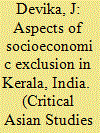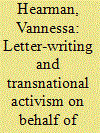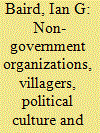|
|
|
Sort Order |
|
|
|
Items / Page
|
|
|
|
|
|
|
| Srl | Item |
| 1 |
ID:
144914


|
|
|
|
|
| Summary/Abstract |
This article probes the intersection of spatial, caste, and gender axes of power in shaping contemporary inequalities in Kerala, through mixed-method research in an urban slum. Relying largely on qualitative data, it constructs a history of work in the slum for lower caste men and women against the backdrop of Kerala politics from the 1940s until the present. It examines the role of widening gender gaps, the persistence of secularized caste, and flagging working-class politics and discourse in shaping contemporary socioeconomic exclusion in urban areas.
|
|
|
|
|
|
|
|
|
|
|
|
|
|
|
|
| 2 |
ID:
144918


|
|
|
|
|
| Summary/Abstract |
Approaches and instruments focused on market mechanisms and private enterprises, including private protected areas, are promoted as ways to resolve global environmental and developmental problems. In Indonesia, Ecosystem Restoration Concessions (ERCs) have been developed as a new market-oriented governmental instrument to counter current deforestation processes and to restore forest ecosystems. Conservation and development organizations, along with state authorities, view ERCs as a highly promising instrument in Indonesia and in other countries as well. Experiences with ERCs are still limited, however, and their viability is uncertain. The implementation of ERCs in Indonesia has been controversial and the impact of ERCs on forests and forest-dependent communities has been fiercely disputed. This article explores these conflicts and disputes with a focus on the Harapan ERC and weighs the relevance of ERCs for German development cooperation. The improvement of the accountability of such projects and the implementation of mediation facilities are emphasized as prerequisites to establishing such market-oriented instruments according to international standards of nature conservation, the rights of indigenous and local populations, and sustainable development. The author concludes that decisions about strategies and instruments applied in forest-related development cooperation must involve a reconsideration of the mindsets that currently determine conservation approaches and development cooperation.
|
|
|
|
|
|
|
|
|
|
|
|
|
|
|
|
| 3 |
ID:
144913


|
|
|
|
|
| Summary/Abstract |
This article presents a critical comparison of the ongoing peace processes in the southern Philippines and Myanmar (Burma). It does so by examining two key armed groups: the Moro Islamic Liberation Front (MILF) on Mindanao, and the Karen National Union (KNU) in Myanmar. We identify common elements that help to explain the relative – albeit incomplete – success of these two groups in navigating their respective peace processes. The MILF and KNU are ethnonationalist armed groups struggling for self-determination against states that are experienced by ethnic minority communities as culturally alien, and economically and politically dominant. Both conflict actors are characterized by complex combinations of “greed” and “grievance” factors but nevertheless enjoy significant (albeit contested) political legitimacy among the communities they seek to represent. We explore the complex relationships between armed ethnic groups, conflict-affected communities, and civil society actors. We argue that engagement with civil society is a key element of success in the Mindanao peace process, which could be replicated in Myanmar. We examine the roles and changing nature of the state in the Philippines and Myanmar, and contrast the degrees of international involvement, as key variables in these peace processes. We observe that negotiations of comprehensive peace settlements are threatened by “the tyranny of elections” in Myanmar (2015) and the Philippines (2016), and observe the importance of including national parliaments in peace processes in a timely manner. The peace process between Manila and the MILF represents a rare example of a Muslim minority pursuing its political objectives through structured dialogue. The article focuses on the challenges faced by armed groups moving from insurgency to reinvent themselves as credible political actors and governance authorities. Our analysis draws on peace-building literature, specifically the phenomenon of “rebel governance.”
|
|
|
|
|
|
|
|
|
|
|
|
|
|
|
|
| 4 |
ID:
144912


|
|
|
|
|
| Summary/Abstract |
Amnesty International estimated in 1977 that between 600,000 and 750,000 Indonesians had been or were still imprisoned as a result of the Army-led anti-communist violence in Indonesia in the mid-1960s. This article charts the relationship between members of Amnesty International and the Religious Society of Friends (Quakers) with a political prisoner on death row in East Java, Gatot Lestario, a former leader of the Indonesian Communist Party. This article draws on the letters he wrote over a period of three years before his execution in 1985 and interviews with his pen pals. It traces the ways in which he encouraged his pen pals to advocate for human rights in Indonesia and their responses, as well as his own involvement in political prisoner advocacy. This case study illustrates the disappearance of Indonesia's previously close and solidary relationship with the socialist world and its replacement at the people-to-people level with human rights activism involving Western activists. This is particularly evident in the increasingly important role played by members of Amnesty International, the Quakers and other overseas organizations concerned with Indonesia. Finally, the article assesses Gatot Lestario's impact, after his execution, on the development of a long-term advocacy network for Indonesia's political prisoners.
|
|
|
|
|
|
|
|
|
|
|
|
|
|
|
|
| 5 |
ID:
144917


|
|
|
|
|
| Summary/Abstract |
The Lower Sesan 2 (LS2) Hydropower Project in northeastern Cambodia is presently under construction. As the largest dam to ever be built in Cambodia, it is expected to cause serious and widespread environmental and social impacts. This article analyzes, on the one hand, the relationships between Cambodian non-government organizations (NGOs) and villagers who will be negatively impacted by LS2, and on the other, NGO relations with the Cambodian state. While development actors frequently attempt to construct particular narratives in order to control development trajectories, this research demonstrates that such attempts can meet with serious resistance from local people, even when facing powerful opponents, including in this case NGOs that prefer to advocate for better resettlement and compensation conditions rather than for the cancellation of projects. Focusing on interactions, positioning, local agency, and the particular political culture of Cambodia, this article highlights the importance of particular types of patronage relations in Cambodia between NGOs and villagers, NGOs and the state, and associated territorialization.
|
|
|
|
|
|
|
|
|
|
|
|
|
|
|
|
| 6 |
ID:
144916


|
|
|
|
|
| Summary/Abstract |
Throughout the developing world, rapid urbanization is leading to new social relations and new conflicts between urban and (formerly) rural populations. This paper examines this process of change through a detailed examination of changing rural–urban relations in the town of Darjeeling, in the Himalayan foothills in Eastern India. In Darjeeling, increased rural mobility, accelerated rural-to-urban migration and the increased participation of rural people in local politics have led to major changes in the town. We demonstrate that the upward trajectory of rural classes who were previously subordinate is leading the more established urban residents to feel threatened, resulting in a redrawing of local political issues along rural–urban lines and a reconfiguration of class consciousness and social relations. The urban middle class, whose opportunities in the town have stagnated or declined, see rural migrants as a source of competition for increasingly scarce resources and blame them for the overall decline in the quality of urban life. They mobilize their (predominantly cultural) capital to reinforce markers of cultural distinction between them and the rural migrants and to delegitimize the political gains they have made. We argue that rural–urban conflict is emerging as the chief source of tension in the town and that this tension is largely grounded in class issues.
|
|
|
|
|
|
|
|
|
|
|
|
|
|
|
|
| 7 |
ID:
144915


|
|
|
|
|
| Summary/Abstract |
Japan has one of the world's largest and most diverse legal sex industries. In a limited female labor market, sex industry work is a stigmatized yet lucrative form of women's short-term employment and advertisements for recruiting new employees are prominently displayed across urban spaces associated with feminized consumption. In this article, I examine the ideological impasses that adult Japanese women working in Tokyo's sex industry express when talking about their motives for pursuing this work. Female sex workers commonly justify their work as the necessary sacrifice of filial daughters. This rhetoric of reluctant acceptance for the sake of others, however, obscures the reality that many sex workers are middle-class and college-educated women who find the financial opportunity and flexibility of this industry appealing in contrast to more dominant forms of feminized labor. These women express the ambivalence of their desires for economic self-sufficiency through narrating the dependence of others on them. Examining these ambivalences, I argue that sex workers’ motivations can only be understood through considering the ethical and moral frameworks that define the gendered economies in which they labor.
|
|
|
|
|
|
|
|
|
|
|
|
|
|
|
|
|
|
|
|
|